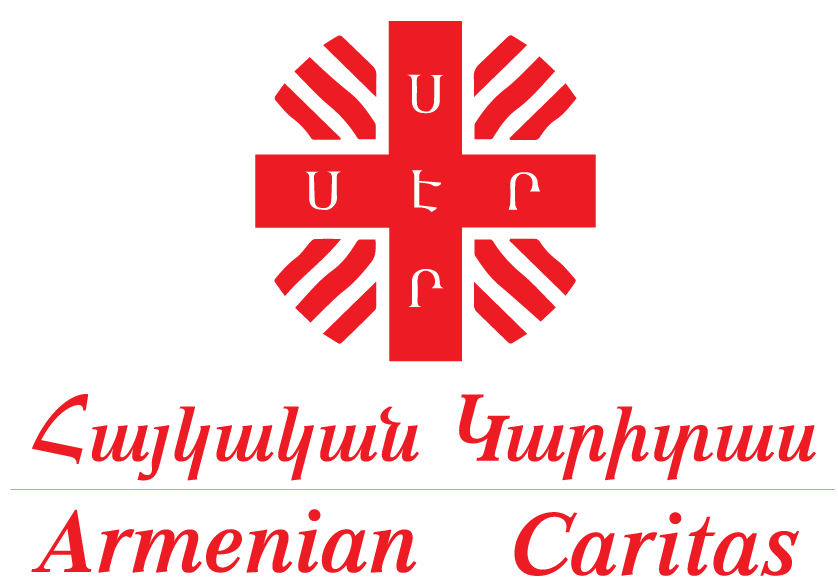Project Evaluation
1.Background information
“Armenian Caritas” was founded in 1995 by the Armenian Catholic Church with the extensive support from the Catholic Relief Services.
“Armenian Caritas,” which has ‘Benevolent NGO status,’ focuses its efforts on social protection and care, community-based development programs to improve the living and educational conditions, to improve public health to the most vulnerable social groups, migration and integration to implement sustainable reintegration measures for returnees and humanitarian and development activities. Since the beginning of its work, “Armenian Caritas” has provided direct assistance to thousands of people in 125 communities of Armenia.
“Serve different vulnerable groups with love and compassion, respecting the dignity of each individual:” this is the mission which leads “Armenian Caritas.” The vision of “Armenian Caritas” is to be a strong and significant role player in consolidation of social justice and social protection in the Republic of Armenia.
“Armenian Caritas” is a member of the Caritas Internationalis confederation and Caritas Europe, and international Caritas network of over 160 members that provides emergency aid and support to countries all around the world.
- Introduction
The purpose of this evaluation is to assess the effectiveness and impact of the project with the overarching goal of contributing to the shaping, preserving, and improving the rural development in Northwest Armenia. The project focuses on small-scale agricultural populations in seven villages and aims to achieve specific objectives related to drinking water and irrigation, processing and marketing facilities, public health education, and resource-conserving cultivation.
III. Objectives of the Evaluation
Assess Overall Project Impact:
Evaluate the extent to which the project has contributed to shaping, preserving, and improving the rural living space as a basis for economic livelihood.
Specific Objective 1:
Assess the rehabilitation of drinking water and irrigation supply facilities, focusing on the achievements of indicators such as the construction of drinking water pipes, functionality of irrigation canals, operational pumping stations, and the construction of cattle watering troughs.
Specific Objective 2:
Assess the establishment of processing and marketing facilities in four selected villages, focusing on the operational milk collection point, the collective enabling and marketing of wild herbs, and the drying of fruits from plantations and home gardens.
Specific Objective 3:
Assess the effectiveness of education initiatives targeting the population of seven municipalities, including training activities, awareness of basic hygiene rules among children and adults, and the impact of the education program on children’s hygienic behavior, lifestyle, and community engagement.
Specific Objective 4:
Assess the adoption of resource-conserving cultivation practices by small-scale family farms, with a focus on indicators related to water distribution based on community decisions and the availability of sufficient, good-quality seed and planting material.
- Methodology
The evaluation will employ a combination of quantitative and qualitative methods, including:
Document review (project reports, financial records, etc.)
Key informant interviews with project stakeholders
Field visits to project sites for direct observation
- Reporting
The evaluation report should include:
Executive Summary.
Introduction and background.
Methodology detailing data collection methods.
Evaluation findings, organized by specific objectives.
Conclusions, lessons learned, and recommendations for future actions.
Annexes with supporting documents and data.
- Timeline
The evaluation is expected to be completed within a month (01.02.2024-29.02.2024], with a draft report submitted for review one week before final report submission and the final report delivered by 29th of February, 2024.
VII. Budget
A budget estimate for the evaluation should be provided, covering costs related to field visits, data collection, analysis, and report production.
This Terms of Reference aims to guide the evaluation process and ensure a comprehensive assessment of the project’s achievements and impact.
VIII. Financial procedures
The payment will be made as follows:
1st instalment – 40% (after signing the agreement); and
Final instalment – 60% (after submission of final deliverables)
- Procedure for submission of expression of interest
Interested consultants / organizations should submit their applications to a.margaryan@caritas.am and info@caritas.am before 22nd of January, 2024. Please, put ‘DRM evaluation’ in the subject field of your e-mail.
- CV(s) of evaluator(s)
- A cover letter including remuneration requirements and contact information
Applications not including all of the above information will not be reviewed. Only short-listed candidates will be contacted.
